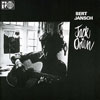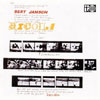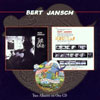

BERT JANSCH : JACK ORION / NICOLA
-
Jack Orion
- The Waggoner's Lad
- First Time Ever I Saw Your Face
- Jack Orion
- The Gardener
- Nottamun Town
- Henry Martin
- Blackwater Side
- Pretty Polly
Nicola - Go Your Way My Love
- Woe Is Love My Dear
- Nicola
- Come Back Baby
- A Little Sweet Sunshine
- Love Is Teasing
- Rabbit Run
- Life Depends On Love
- Weeping Willow Blues
- Box Of Love
- Wish My Baby Was Here
- If The World Isn't There
Label : Transatlantic Records
Length : 64:41
Released : 1966 (Jack Orion) / 1967 (Nicola)
Review from AllMusic (Jack Orion) : After presenting almost all-original sets on his first two albums (albeit originals that sometimes borrowed heavily from traditional folk themes), Jansch opted to devote all of his third LP to traditional folk numbers. His future Pentangle partner John Renbourn joins him on four of the eight songs. Highlights include the ten-minute title track (whose length was a real oddity on contemporary folk albums of the time) and a cover of "Nottamun Town" (whose melody Dylan lifted for "Masters of War"). Not as original as the artist's first two LPs, the guitar and vocal work on these adaptations were still as influential to the '60s folk world as anything else in Jansch's catalog.
Review from Wikipedia (Jack Orion) : Jack Orion is the third album by Scottish folk musician Bert Jansch, released in 1966. It contains a number of traditional songs, including the epic Jack Orion: a ten-minute adaptation of the Child ballad Glasgerion which tells of a court fiddler's attempt to seduce a countess and his servant's treachery in successfully impersonating him. A number of songs are performed with friend and fellow guitarist John Renbourn, who would later join him in the group Pentangle. The Waggoner's Lad has Jansch unusually playing the banjo with Renbourn supplying the guitar part.
Review from AllMusic (Nicola) : Jansch's third solo album is perhaps too lightly dismissed by both folk critics and the artist himself. Bowing slightly to commercial pressures, he allowed orchestration to be used on five of the 12 tracks. Actually, the orchestrated cuts aren't that bad at all, and the remainder are pretty much keeping with the character and high standard of his other '60s work. Nine of the 12 cuts are Jansch originals, and ably display his nimble guitar work, incorporation of blues, traditional British Isles folk influences into a contemporary style, and his Donovan-esque vocals. For the first and only time, he played both electric and acoustic guitars on this LP; it's also his first work to feature drumming. Some of the orchestrated numbers, especially "Woe Is Love, My Dear," were actually deemed to have potential as singles. That didn't happen (the cut "Wish My Baby Was Here" would have been a better choice in any event), but that doesn't take away from their fey period charm. Nicola and Jansch's 1969 release, Birthday Blues, were combined onto one CD on a 1993 reissue.
Review from AllMusic (Nicola) : Nicola is the fifth album by Scottish folk musician Bert Jansch, released in 1967. An orchestrated version of "Train Song" was attempted during the Nicola sessions but, while fondly remembered by arranger David Palmer, did not make the finished product. Neither did two further outtakes "In This Game" and "Dissatisfied Blues" (both of which he performed live during the city hall tour of early 1967) although they later appeared on Box Of Love - The Bert Jansch Sampler Vol. 2 (1972), issued on Transatlantic shortly after Bert had left the label. They have also been resurrected on the new reissue of Nicola.
Liner Notes : Originally released in 1966, Jack Orion is reckoned by many aficionados to be the definitive Jansch album. Apart from the powerful title track, it contains Bert's charismatic instrumental version of Ewan MacColl's classic "The First Time Ever I Saw Your Face" and a haunting interpretation of "Nottamun Town" (later transformed by Fairport Convention on their historic 'Liege And Lief' album). It also includes his arrangement of 'Blackwaterside', the inspiration for Jimmy Page's 'Black Mountainside' on Led Zeppelin's first album. John Renbourn plays second guitar on four tracks : 'The Waggoner's Lad', 'Jack Orion', 'Henry Martin' and 'Pretty Polly'. Bert plays banjo on 'The Waggoner's Lad'. Jack Orion is coupled for the first time on CD with Jansch's fourth album 'Nicola', originally released in 1967. Produced by Nathan Joseph, founder and owner of Transatlantic, it includes several of Bert's songs in arrangements by David Palmer, later to become an important musical collaborator in the work of Jethro Tull.
